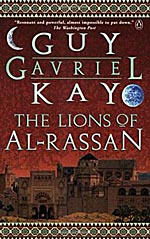
![]() Bormgans
Bormgans
4/22/2022
![]()
(...)
But even with all that in mind, it's somehow puzzling Kay managed to evoke sympathy for Rodrigro or Ammar. Technically, I understand how he did it. They are manly men, strong, smart, caring for their own, and loved by the female main characters. We get to know them and their families. We root for them. What male reader secretly doesn't want to turn out to be "the unacknowledged son of the King", to paraphrase Richard Rorty? Dreams of power and glory are all too human, and Kay exploits them expertly.
I also understand that other characters call these warrior-murderers "good" and "noble" -- again, that is the context these characters live in, and these feelings echo nationalist or religious mantras that are still used today. Said fictional context was also the context my consciousness was transported to for 504 pages.
I guess what I'm trying to say is that I can't make up my mind what I rationally think about our heroes. Is Rodrigo really a loving father if he's absent from his family for years? If he willingly puts himself into mortal danger while he could have retired just as easily? Does Ammar deserve his ending? And how do I feel about Kay for writing a story that presents these pragmatically cruel characters as likeable, even though he also presents us characters such as Alvar and Jehane who are critical of war and bloodshed?
True -- everything is grey, and reality is what it is. There are smooth criminals, sympathetic murderers, democratic elected officials that order bloodshed, and every soldier is indeed human. I know all this. But I'm conflicted about it. I guess I'm conflicted about reality? Do I kid myself when I think I would not commit atrocities beyond what's needed for self-defense or defense of my family in a real life war context? Even if I don't believe in free will, shouldn't we hold soldiers and their generals to higher standards?
In the end, while Kay's message of tolerance and diversity is to be applauded, and certain brutal scenes of heroic life & death and brought me to deep and heartfelt tears, at the same time, he wrote a feelgood book, ending with most of the protagonists happy together, sipping wine, celebrating a birthday, cosy by a fountain.
So there's a conflict at the heart of The Lions of Al-Rassan. At one hand, Kay criticizes bigotry & political greed for the suffering it causes, and luckily he tries to present a balanced view of why these things happen, never pointing fingers at people that are terrified of the Other or blinded by their upbringing. But on the other hand, it also revels in the heroism associated with warriors and violence, and glorifies it to a certain extent.
It may not have been his intention, and it probably is the unavoidable result of trying to show the human side of things. As for historical fantasy's true benefit: it's probably easier to do when there is historical distance -- imagine a book published in 6 months, that tries to balance a certain Russian soldier as a hero too.
(...)
Read the full review on Weighing A Pig Doesn't Fatten It:
https://schicksalgemeinschaft.wordpress.com/2022/04/21/the-lions-of-al-rassan-guy-gavriel-kay-1995/